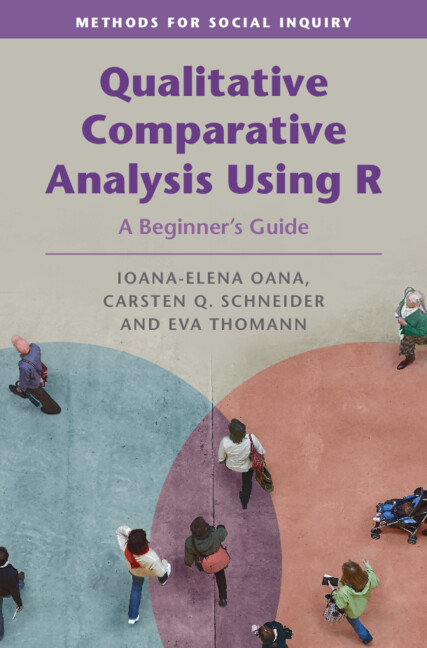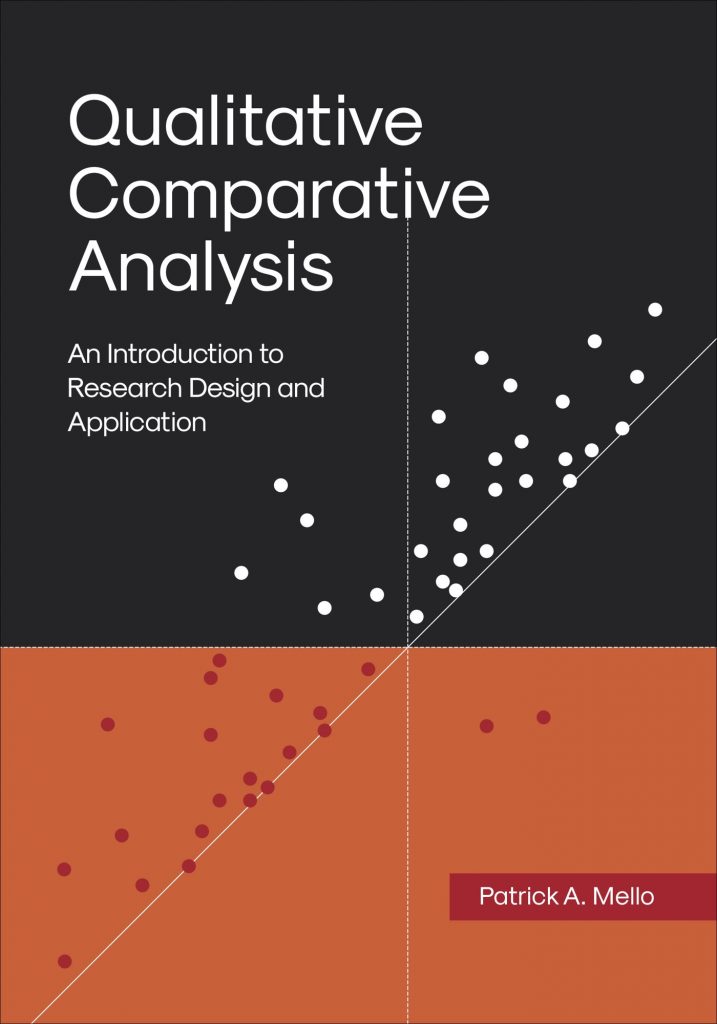József Mezei (Åbo Akademi University) and Shahrokh Nikou (Åbo Akademi University and Stockholm University) are organizing a QCA minitrack for HICSS (Jan 3-6, 2024). Submissions are due by June 15, 2023. Please see the call for papers for details.
All posts by cjr
Set Theory, Constructivism, and Science: A Symposium on James Mahoney’s The Logic of Social Science: Thursday, May 25, 2023
In this hybrid symposium, a panel of scholars discuss James Mahoney’s recent book, The Logic of Social Science. The book develops a scientific constructivist approach that uses set-theoretic analysis to avoid essentialist biases in the production of knowledge. This scientific constructivist approach recognizes that social categories depend on collective understandings for their existence, but it insists that this recognition need not hinder the use of explicit procedures for the rational assessment of truth. Mahoney argues that set-theoretic analysis enables scholars to avoid the pitfalls of essentialism and produce findings that rest on a firm scientific foundation.
All speakers will participate online; you are invited to attend online or in person at Central European University, where the symposium will be followed by a wine and cheese reception.
Report on Time, Process and QCA
In Fall of 2022, Lasse Gerrits and Sofia Pagliarin, both of the Institute for Housing and Urban Development Studies, Erasmus University Rotterdam, organized the first Time-in-QCA (TiQ) workshop. They have now produced a corresponding report of the workshop. More than just reviewing the workshop itself, this report is essential reading for anybody interested in longitudinal QCA: it summarizes existing conceptualizations of the relationships among time and QCA, provides a high-level overview of methodological techniques for incorporating time and process into QCA, and identifies avenues and areas for future exploration.
Report of the first ‘Time-in-QCA’ (TiQ) International Workshop
“A Vocabulary for QCA”
Roel Rutten (Tilburg University) and Claude Rubinson (University of Houston-Downtown) have produced a QCA glossary, available on the Tutorials and Guides page of the COMPASSS website.
New Working Paper by Lauri and Saar
“Intergenerational Transmission of Education: Set-Theoretic Exploration of Accumulation of Social Advantages and Disadvantages in Six European Countries” by Triin Lauri (Tallinn University) and Ellu Saar (Tallinn University).
The aim of the paper is to investigate the patterns of multiple advantages and disadvantages of parental resources measured by educational attainment of both parents as well as parental cultural resources and their impact on the educational attainment of offspring across three cohorts in six European countries – the Czech Republic, Estonia, Germany, Italy, Sweden, and the United Kingdom. We separate the examination of combined advantages from that of combined disadvantages to emphasise the asymmetries in these relationships by employing a novel configurational approach, set coincidence analysis introduced by Ragin and Fiss (2017). The analysis based on the International Assessment of Adult Competencies data (PIAAC) revealed substantial country differences in degrees of cumulative advantages and disadvantages of respondents’ parental resources and also in the linkages between these cumulative patterns and respondents’ educational attainment.
New YouTube Page
COMPASSS now has a YouTube page. Thanks to Sophia Pagliarin for spearheading this initiative! There are just two videos available now but we’d like to highlight talks by members of the COMPASSS community on QCA and related configurational-comparative methods. If you have a talk that you’d like us to host, please contact Claude.
Announcing the QCA Conference of the Americas (AQCA)
We are pleased to announce the launch of the annual QCA Conference of the Americas. Organized by Claude Rubinson (U Houston-Downtown), Peer Fiss (U Southern California) and Gary Goertz (Notre Dame), the inaugural meeting will be held April 6-8, 2022 at the University of Houston-Downtown. Charles Ragin (UC Irvine) and James Mahoney (Northwestern) will deliver the keynote addresses.
Responding to the growing interest in understanding causally complex phenomena in a configurational and comparative manner, AQCA will provide a venue for the broad, cross-disciplinary community of QCA empirical researchers and methodologists to gather together to present and receive feedback on current research projects, share theoretical and methodological developments, and discuss new directions in configurational-comparative research practices. AQCA offers a supportive environment for the diverse QCA community to meet, engage in dialogue, network, learn, and collectively move forward on advancing the configurational-comparative perspective.
AQCA will be a broad-tent, inclusive, and diverse venue that is open to everyone interested in learning about, using, and advancing the configurational-comparative perspective. Whatever your field or topic, if you use QCA and/or other configurational-comparative methods or if you are considering using them, then AQCA is for you. Whether your work is empirical, methodological, or theoretical; whether you are a seasoned practitioner or have just discovered the configurational-comparative approach, we hope that you will join us for three days of lively discussions, debates, community building, and learning.
We hope that you will join us in April. For more details and to review our call for abstracts (due date: January 31, 2022), please visit the AQCA website at https://compasss.org/aqca/.
New Book: Qualitative Comparative Analysis: An Introduction to Research Design and Application
Patrick A. Mello (Technical University of Munich) has published Qualitative Comparative Analysis: An Introduction to Research Design and Application (Georgetown University Press, 2021).
Qualitative Comparative Analysis: An Introduction to Research Design and Application is a comprehensive guide to QCA. As QCA becomes increasingly popular across the social sciences, this textbook teaches students, scholars, and self-learners the fundamentals of the method, research design, interpretation of results, and how to communicate findings.
Following an ideal typical research cycle, the book’s ten chapters cover the methodological basis and analytical routine of QCA, as well as matters of research design, causation and causal complexity, QCA variants, and the method’s reception in the social sciences. A comprehensive glossary helps to clarify the meaning of frequently used terms. The book is complemented by an accessible online R manual to help new users to practice QCA’s analytical steps on sample data and then implement with their own findings. This hands-on textbook is an essential resource for students and researchers looking for a complete and up-to-date introduction to QCA.
New Book: Qualitative Comparative Analysis with R: A Beginner’s Guide
Ioana-Elena Oana (European University Institute), Carsten Q. Schneider (Central European University), and Eva Thomann (Universität Konstanz) have released Qualitative Comparative Analysis with R: A Beginner’s Guide (Cambridge University Press 2021).
A comprehensive introduction and teaching resource for state-of-the-art Qualitative Comparative Analysis (QCA) using R software. This guide facilitates the efficient teaching, independent learning, and use of QCA with the best available software, reducing the time and effort required when encountering not just the logic of a new method, but also new software. With its applied and practical focus, the book offers a genuinely simple and intuitive resource for implementing the most complete protocol of QCA. To make the lives of students, teachers, researchers, and practitioners as easy as possible, the book includes learning goals, core points, empirical examples, and tips for good practices. The freely available online material provides a rich body of additional resources to aid users in their learning process. Beyond performing core analyses with the R package QCA, the book also facilitates a close integration with the R package SetMethods allowing for a host of additional protocols for building a more solid and well-rounded QCA.

New Working Paper
“Analyzing Relations of Necessity in Survey Research: Incorporating Notions of Fuzzy-Set Qualitative Comparative Analysis and Bootstrap” by Daisuke Mori of Kumamoto University.
Correlation coefficients often used in quantitative research, such as survey research, cannot adequately measure certain key aspects within the relation of necessity. In this paper, I focus on Qualitative Comparative Analysis (QCA), enabling the analysis of set relations or relations of necessity and sufficiency, and try to incorporate it into the analysis of survey research. I present the parameters of fit in a fuzzy-set QCA to measure such a relation. I also show the methods used to conduct statistical inferences to understand the properties of a population based on a random sample from that population. For example, I analyzed the survey data on the purpose of tort damages in the case of a defective car accident in Japan. In this survey, respondents were asked about the extent to which they considered five factors in deciding the amount of damages: compensation for monetary loss, punishment, compensation for mental suffering, deterrence, and satisfying the feeling of retribution. I found that compensation for monetary loss is not correlated with punishment, deterrence, and satisfying the feeling of retribution. However, compensation for monetary loss is a necessary condition. The analysis of relations of necessity can highlight relations that have not been detected by conventional statistical analysis based on correlations.

